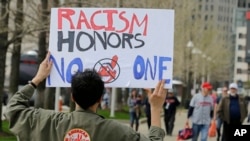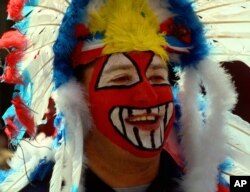Native Americans took to social media Monday to celebrate the pending “death” of Chief Wahoo, the longtime logo of the Cleveland Indians baseball team which features a garish “Indian” caricature that is offensive to America’s first peoples.
But the victory is only a small one for Twitter users, using the hashtag #NotYourMascot: The Cleveland Indians won’t be changing the team's name; the team will still be able to sell Chief Wahoo merchandise; and fans won’t be blocked from wearing clothing bearing the logo.
In a statement released Monday, Major League Baseball commissioner Rob Manfred said he told team owner Paul Dolan that the time had come to remove the caricature that has appeared on players’ caps and uniforms since 1948.
“Over the past year, we encouraged dialogue with the Indians organization about the club's use of the Chief Wahoo logo,” Manfred said. “During our constructive conversations, Paul Dolan made clear that there are fans who have a longstanding attachment to the logo and its place in the history of the team.
"Nonetheless, the club ultimately agreed with my position that the logo is no longer appropriate for on-field use in Major League Baseball, and I appreciate Mr. Dolan's acknowledgement that removing it from the on-field uniform by the start of the 2019 season is the right course."
For decades, Native American activists and their supporters have protested the logo, a cartoon of a grinning red-skinned man in a feathered headband. They have complained that the image is offensive and perpetuates racist stereotypes about America’s first peoples.
In 2014, a group called People Not Mascots filed a federal lawsuit seeking $9 billion in damages. Two years later, a Canadian man sued the team in an attempt to prevent it from wearing the Chief Wahoo logo during games in Toronto.
In recent years, many schools and universities across the country have stopped using Native Americans in their team names or as mascots. But according to MascotDB, a database of sports team names and mascots, many hundreds of American teams retain Indian imagery, ranging from local high schools to major teams like the Washington Redskins.
“Today’s announcement marks an important turning point for Indian Country and the harmful legacy of Indian mascots,” said Jefferson Keel, president of the National Congress of American Indians. “These mascots reduce all Native people into a single outdated stereotype that harms the way Native people, especially youth, view themselves.”





